Hundreds of Grinnell College students staged a walkout on Wednesday morning to express solidarity with Palestine and demand that the College stop any financial support of Israeli hostilities.
Grinnell College Students Rally for Palestine
Demonstrators gathered in the Humanities and Social Studies Center to hear student organizers call for a ceasefire before marching to Nollen House to symbolically deliver the demands to College administrators. Students carried signs reading “FREE PALESTINE” and “Zionism is white supremacy” and chanted “Netanyahu, you can’t hide, we charge you with genocide,” in reference to Israel’s prime minister.
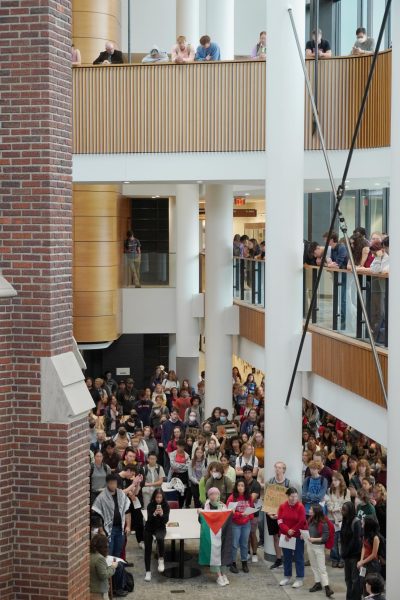
Grinnell Students for Justice in Palestine (SJP) organized the walkout to demand an end to the siege on Gaza and United States military funding and arms to Israel. The walkout at Grinnell was part of an international day of pro-Palestine demonstrations facilitated by the Palestinian Youth Movement, an organization with over 200 college chapters in America and Canada aimed at creating a united front against the Israeli occupation of Palestine.
“This is a sign of unity. This is us taking collective action,” said the first speaker, a leader for Grinnell SJP, who remains unnamed to protect their identity. “We won’t stand for the violence that we are seeing.”
“I am Jewish. I am an anti-Zionist,” the speaker said. “I reject that being Jewish means blindly supporting the murder of children. I reject that the collective trauma of my people be wielded as a tool to oppress another population.”
To date, Israeli strikes on Gaza have claimed at least 6,546 lives, including 2,704 children, according to the Palestinian Ministry of Health. The U.N. Office for the Coordination of Humanitarian Affairs says there are 1.4 million Palestinians internally displaced in Gaza.
A Palestinian student spoke after the three Grinnell SJP leaders, condemning the violence by both sides and asking people to recognize the humanity of Palestinians.
“The family that I have in Gaza that have gone missing? They’re not terrorists,” the student said. “And they still were bombed and were still labeled the same way as the Hamas militants. Terrorists. Inhumane. Human animals. This needs to end.”
Grinnell SJP leaders distributed to demonstrators a list of demands for the College, asking students, alumni, faculty, staff and community members to apply coordinated, unified pressure on the administration and trustees.
“I reject my tuition being used for the escalation of war crimes,” the third speaker said, also a leader of Grinnell SJP, sparking loud cheers from the crowd of students.
The demands included more transparency from the College on its investments and immediate divestment from any and all investments that financially support Israel or its military, pointing to Grinnell’s history as one of the first academic institutions to divest from South African apartheid.
Students also insisted that the College release a statement acknowledging the “genocidal violence” and “ethnic cleansing of Palestinians” and calling for a ceasefire in Gaza and an end to U.S. military aid to Israel. Students urged that a scholarship fund be created for Palestinian students and more Palestinian scholarship incorporated into course curricula.
“We cannot call ourselves a socially just institution while continuing to stay silent in the face of Israeli apartheid and oppression,” wrote Grinnell SJP.
The Israel-Hamas Conflict: A Backdrop
Israel formally declared war against Hamas on Oct. 7 after the Islamist militant group fired rockets into Israel and stormed southern Israeli cities, killing and injuring hundreds of soldiers and civilians and taking over 200 hostages. The Israeli military retaliated with intensified counter-attacks and a complete siege of Gaza, halting the supply of electricity, food, water and fuel to the Palestinian enclave.
Grinnell SJP leaders wrote in a statement of solidarity on Oct. 11 that “peace is contingent on lifting the blockade, ending the illegal Israeli occupation, and dismantling the Israeli apartheid state,” adding that “there can be no peace without Palestinian liberation.”
Last week, President Biden requested a $105 billion national security package that includes $14 billion to help Israel defend itself against Hamas. Biden is hoping that bundling aid for Israel and Ukraine will increase the likelihood of passage through a Congress increasingly divided on aid packages. Included in the administration’s request is $10 billion for humanitarian relief for Israel, Gaza and Ukraine.
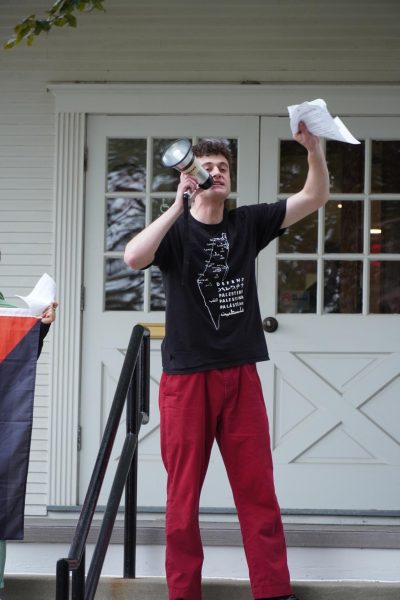
Tensions Rise in U.S. Colleges over Israel-Palestine Stances
The demonstration at Grinnell came at a time when tensions are high between students, administrators, donors and lawmakers across the United States.
Prominent Harvard University alumni recently denounced a pro-Palestinian statement signed by 34 student organizations that held the Israeli government “entirely responsible for all unfolding violence.” Some alumni also threatened to stop donations unless the university took action against the signatories.
Similar controversies have played out at other colleges, including three Ivy League students losing job offers after their employers learned of their pro-Palestinian stances.
In Florida, governor and Republican presidential candidate Ron DeSantis ordered the State University System of Florida on Oct. 24 to shut down chapters of SJP.
In Iowa, Republican Senator Joni Ernst advocated for the federal defunding of some colleges that are “promoting antisemitism.”
Grinnell College Administration Responds to the Protest
The promotion of the walkout on Tuesday via College platforms prompted a response from the College on Wednesday morning. At least one member of Grinnell SJP sent emails to numerous student organization distribution lists, encouraging students to participate in the walkout.
College President Anne Harris wrote in an all-campus email sent Wednesday that “the College does not endorse the content of these communications.”
“As an institution, we affirm the right to assembly and support free speech and expression in the form of protest and demonstration,” Harris wrote. “We simultaneously have responsibilities to each other. We have a responsibility to sustain an environment free from harassment and discrimination.”
A reference by Grinnell SJP leaders to Harris’ email was met with a chorus of “boo.”
Grinnell College has not released a statement on the Israeli-Palestinian conflict since Oct. 9, when President Anne Harris shared a message mourning the loss of life on both sides.
Grinnell SJP leaders encouraged students to contact the College’s Board of Trustees and continue demonstrating support for Palestine moving forward.
“[Today] is a drop in a very, very large barrel. A step in a very, very long fight. The fight for Palestinian justice is not going to end today, it’s not going to end tomorrow,” said a Grinnell SJP leader. “So it’s important that we are speaking up today and using this as a point to jump off of to continue organizing in solidarity with Palestine in the long run.”
The S&B requested comment from President Harris and was directed to Ellen de Graffenreid, vice president of communications and marketing. De Graffenreid said that Harris is currently traveling and referred the S&B to Harris’ email sent on Wednesday morning.



















































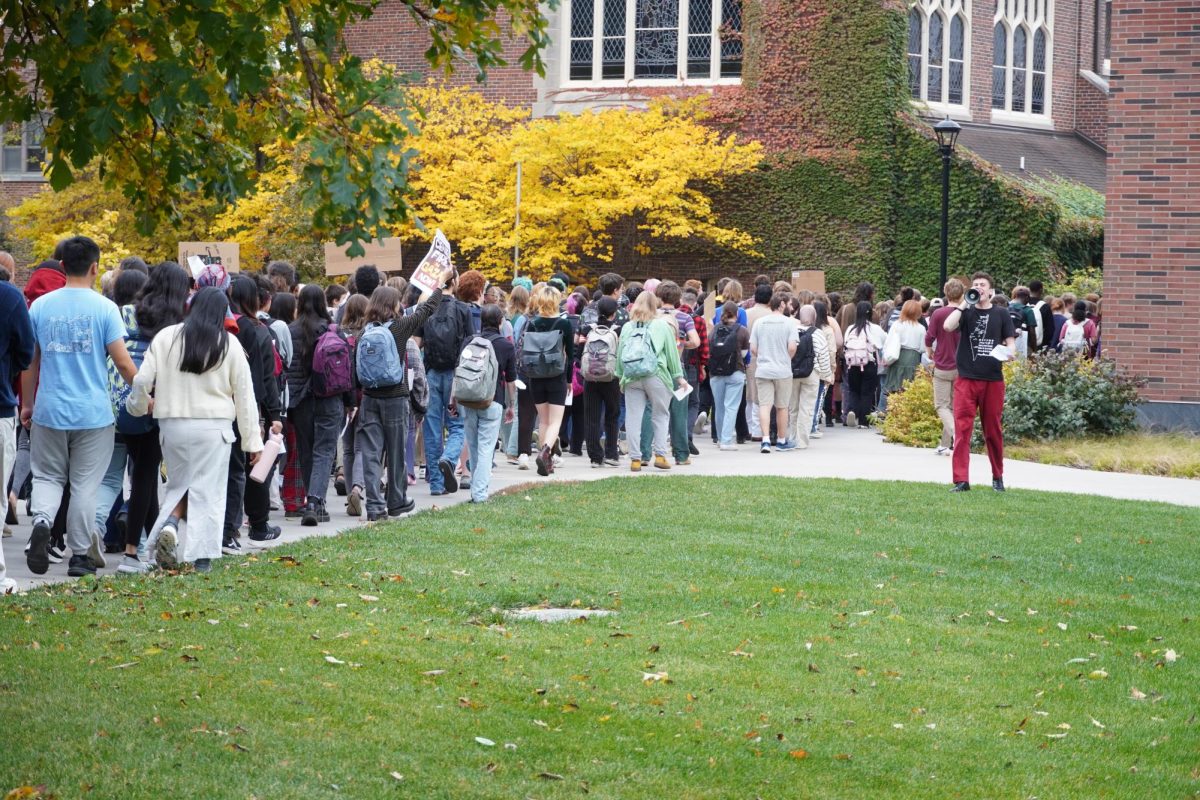

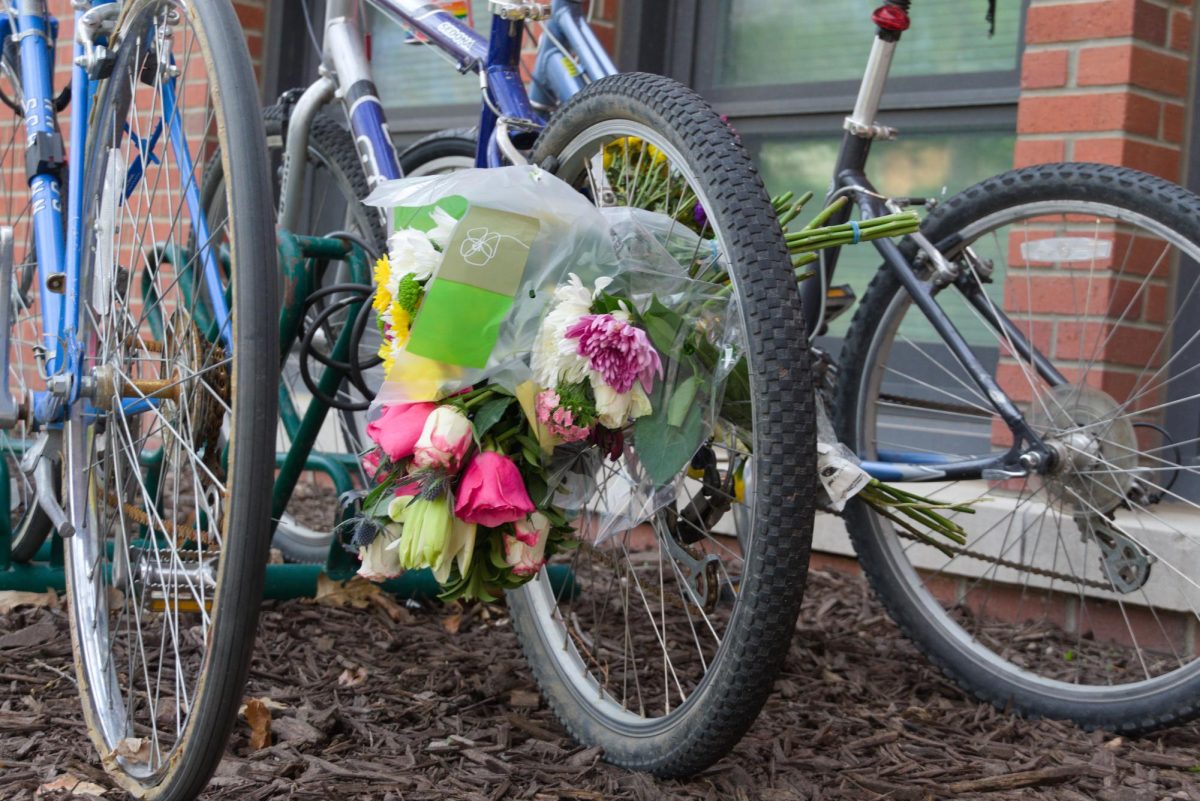
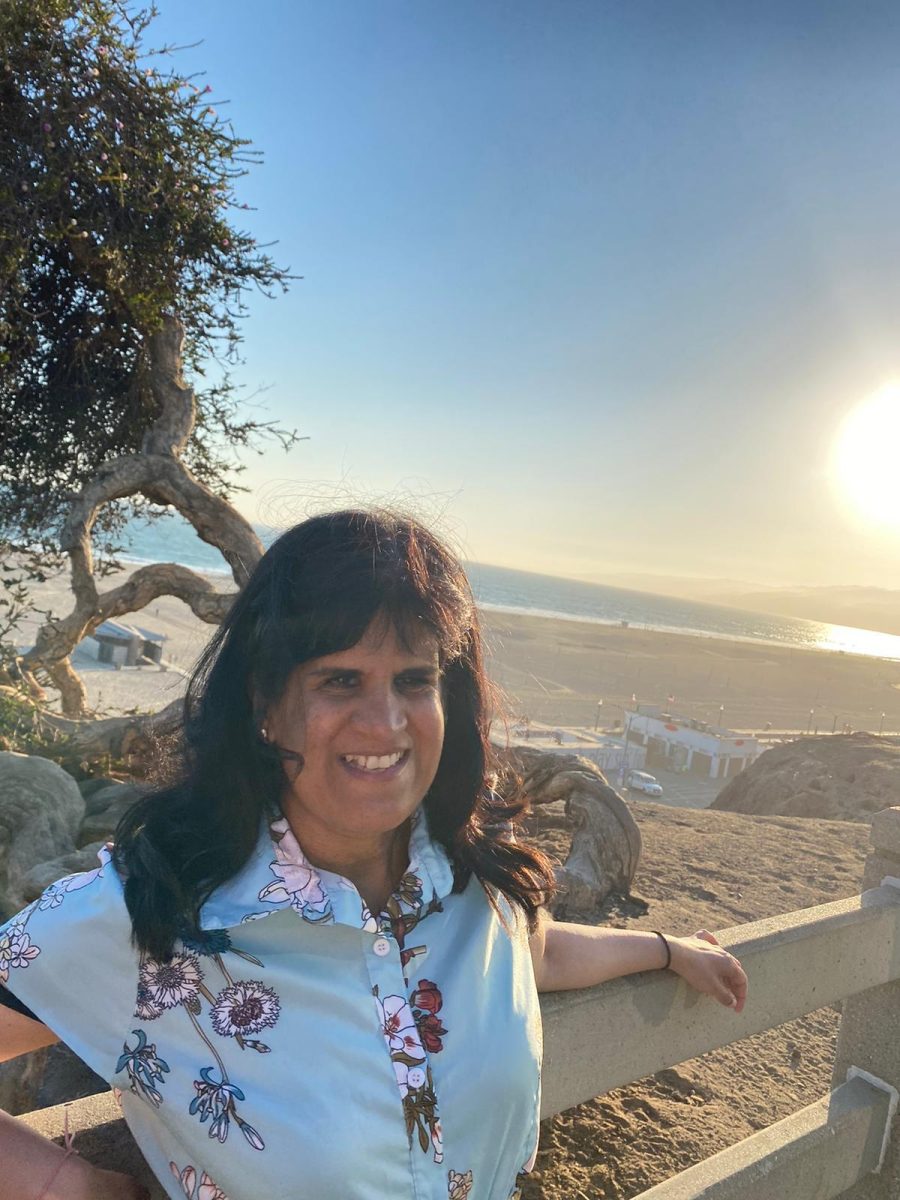
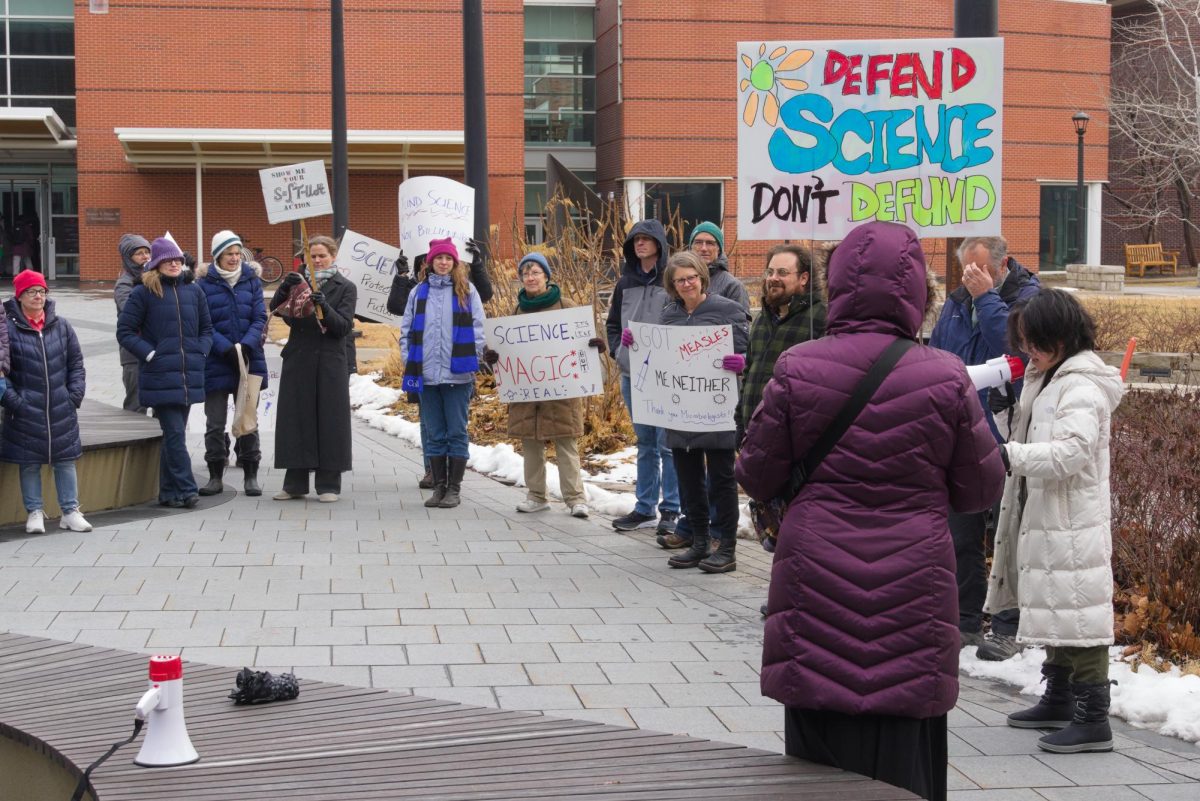

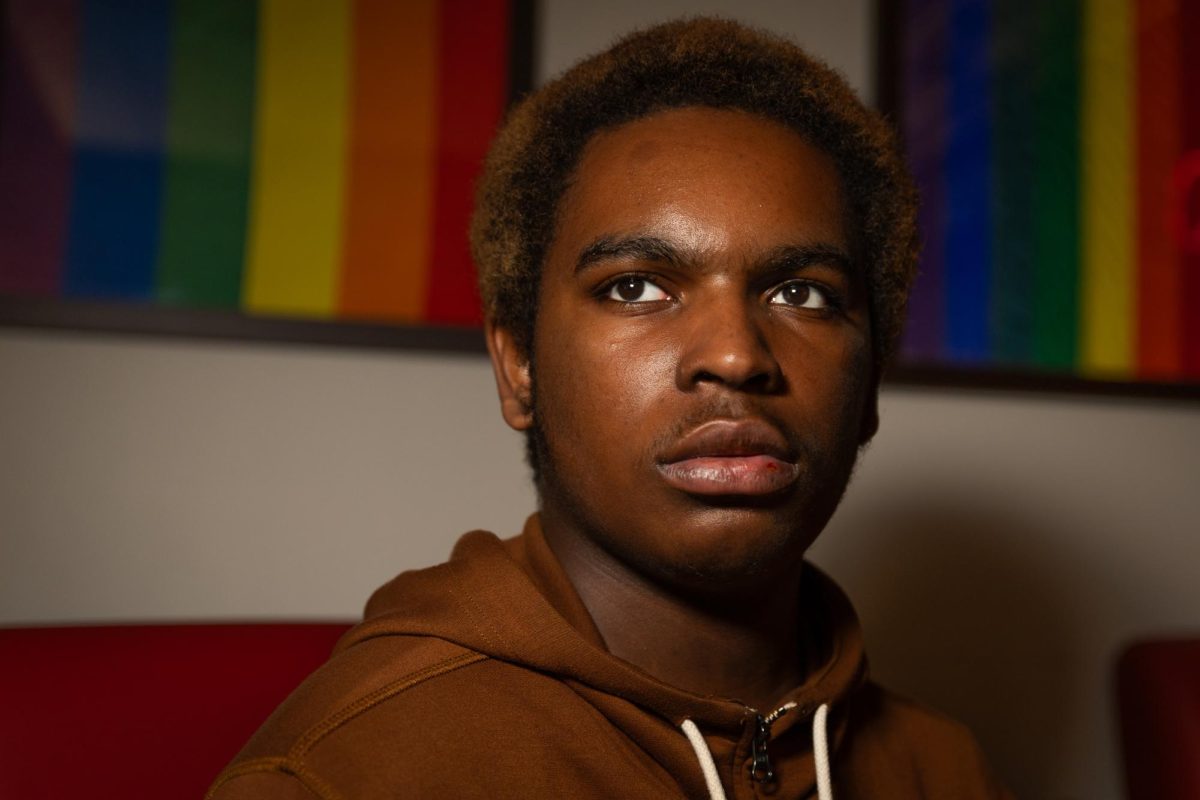



Sam Smith • Apr 24, 2024 at 3:32 pm
One of the arguments that confuses me about divestment is that the tuition does not even typically cover operating costs for an academic institution. Only forty percent of revenue at private institutions comes from tuition according to the National Center for Educational Statistics. I feel in general there is a very evident Dunning-Kruger effect at Grinnell College, and wish people would think more carefully before making these statements in general.
Bill Baar '76 • Nov 20, 2023 at 6:39 am
It’s a sad moment for Grinnell and Grinnellians. Liberalism’s taken a turn into the sewer. Glad many of my Profs no longer around to see this.
Gary Gaines • Nov 6, 2023 at 4:08 pm
The ignorance on display by Grinnell students is appalling. I hope to see a strong and unequivocal response by the school in support of Israel’s right to defend itself against Hamas.
Yes, the Middle East is complicated. But learn enough to understand what is going on and that your support of Hamas leads to vastly more death and suffering, not to peace and justice.
Rebecca McLaughlin • Nov 4, 2023 at 8:44 pm
As an anti-Zionist Jewish alum, I am so proud of these students! I join in their call for a stronger statement from the college, and full divestment from the Israeli apartheid state.
Jay Kratz • Oct 26, 2023 at 5:05 pm
Disgraceful response from the trustees and President Harris. Thank you to the brave Grinnellians standing up for Palestine!
Sally • Oct 29, 2023 at 10:19 am
What is disgraceful? President Harris’ reminder of the First Amendment and common courtesy?
Bill S • Oct 25, 2023 at 10:00 pm
The enemy is Hamas, not Israel. Hamas brought the war to Israel. Hamas uses Palestinian citizens as shields for their munitions. Hamas has corruptly taken billions of dollars in aid intended for Palestinians and used it for weapons and to finance Hamas’ leaders lives of luxury in Qatar.
Israel vacated Gaza in 2005. Hamas turned it into a launchpad for terror. Hamas doesn’t want peace, they want to destroy Israel and kill all Jews.
There can be no peace until Hamas is eradicated.
Jordan S. • Oct 27, 2023 at 6:35 pm
As long as apartheid and occupation exists, there will be armed resistance. Even if Hamas could be destroyed, more armed resistance would arise in their place, as long as Palestinian land is stolen and they are headed into concentration camps.
David N • Oct 29, 2023 at 7:32 am
While I agree that Israel enegages in theft of land in the West Bank, it is equally true that killing 1,500 civilians, including the eldery and children and taking over 200 of them as human shields on top of using the vast majority of Palestinian citizens as hostages is also an atrocity. Feel free to point out any major power in the past 200 years who would not do what Israel is doing or more. You benefit significantly from the horrible things the world powers have done. Is it ok for you to benefit from this but not others? I’m not saying what Israel’s government is doing is right (I think it is a horrible mistake) but to place all the blame on Israel and to hold Israel to a significantly higher standard than other nation reeks of antisemitism.
David N • Oct 30, 2023 at 10:33 am
As someone who has worked on peace efforts in the US and in the middle east, I subscribe to the philosophy that to the degree any party here points to the wrong doings on the other and uses that to justify atrocities in the present, or to keep from trying to peace in the present/future, we are never going to achieve peace. Ever. Both sides have groups and individuals who have done horrible, unspeaking able things. Both sides have groups and individuals who also done incredibly brave and courageous things. Focusing on the horrible stuff means being stuck in horribleness forever.
I don’t recite the atrocities, not because I am not aware of them, but because the list on all sides is too, too long. And because focusing on the horribleness of the past does not make things better for anyone on the ground in the present.
I get it. I was once on one side of this issue and felt my side was the good side and the other side was evil. I get the satisfaction of being on the “good team.” I understand the very powerful, satisfying, righteous pleasure that comes from thinking this way.
But especially on this issue, its an illusion. Blaming one side for scores and scores of atrocities and holding the other blameless, ignores the fuller reality, and more to the point, (and my priority) doesn’t help anyone on the ground. It may make the speaker feel better about themselves in a very shallow, sanctimonious way, but it does nothing to help out the people who are suffering.
If the leaders of this group really had intellectual courage, they would not be taking the easy way out and slamming Jews, who have few supporters, but would be seeking out ways to support groups and individuals who have been working hard to find ways for all parties to live together.
I pray and work for peace in Israel and Palestine. I hope the war ends immediately. I hope the hostages are released. I hope the governments of the world come together and remove Hamas and help build a thriving Palestinian nation that can live and thrive alongside Israel, and that the nation of Palestine. I hope and pray that these nations, made up of peoples who have lived in this part of the world side by side for thousands of years, most of that in peace and harmony, can return to that relationship.
Sally • Oct 29, 2023 at 10:22 am
Can you define apartheid, occupation and concentration camps? Can you even place Israel on a map? These are very serious assertions. Please define with supporting information, and state how these terms are relevant to this situation, citing historical examples.
Rebecca McLaughlin • Nov 4, 2023 at 8:50 pm
There is a lot of easily accessible reading on these questions. I’m not able to share links in this comment but the recent UN resignation letter re genocide, other past UN analyses re apartheid, amnesty international re apartheid, as well as Nelson Mandela and Desmond Tutu.
Jane Heartfield '22 • Nov 17, 2023 at 6:55 pm
> Can you define apartheid, occupation and concentration camps?
Since Jordan has not resonded, I will do this in reverse order.
Concentration camps are temporary settlements intended to concentrate together members of a particular ethnic group. During various times of British control, Palestinians opposed to Jewish settlement were indisputably held in concentration camps; likewise, Israel has established camps for subversive Arabs (including non-violent demonstrators, but also including prisoners of war and militants) over the course of the Arab-Israeli wars. In general, though, I reject the characterization of Israel as establishing concentration camps.
Occupation is the act of taking control of a place by military force or settlement. (That one’s from the dictionary.) Israel was not a state prior to 1948, when a UN resolution came into effect partitioning what was then called “Mandatory Palestine” into two states, one Arab and one Jewish. The UN partition plan of 1947 called for Israel to have 55% of the land, and Palestine 45%. Shortly after the acceptance of this plan by local Jewish authorities — Palestinian authorities in general did not accept it — a civil war broke out in Mandatory Palestine. This became an inter-national war after six surrounding Arab countries attacked the Israeli faction (in support of the Palestinian faction) when the British mandate expired in 1948. By the end of the war, Israel controlled 78% of the territory that had been Mandatory Palestine; the 23% difference could be called ‘occupied’ land. The remaining 22% was also occupied, in this case by the Palestinians’ erstwhile allies.
After the Suez Crisis in 1956, Israel also began occupying Sinai and the Gaza Strip, which they relinquished in 1957. Over the course of the Six-Day War in 1968, Israel once again seized Sinai, in addition to gaining de facto control over the West Bank and Gaza. One third of the Palestinian population was displaced and ultimately not permitted to return; Sinai was relinquished to Egypt in 1982.
Since then, both territories have existed with varying levels of autonomy, particularly after the 1988 Palestinian Declaration of Independence. At no point has Palestine had a serious, standing military, and Israel has remained the de facto military power in Palestine, despite the presence militant groups including Hamas.
‘Apartheid’ is Afrikaans for ‘apartness’. The essential characteristic is systematic, institutional, and legislative discrimination by a country against one or more of its constitutent ethnic or racial groups.
Under Article II of the Apartheid convention, this includes several enumerated acts: denial of the right to life through murder, torture, or arbitrary arrest and imprisonment; imposition of living conditions calculated to destroy in whole or in part; denial of rights to participation in the political, cultural, or economic life of a country; the legislative division of a population along racial lines (segregation) including expropriation of land; forced labor; and persecution of organizations opposed to the above policies.
I don’t think there’s much argument that Israel has engaged in at least several of these enumerated inhuman acts.
(1) Palestinians have been subjected to arbitrary arrest and illegal imprisonment in the form of administrative detention, starting with the imprisonment of over 5,000 Palestinians at the start of the first Intifada and continuing to this day; see the report of the UN High Commissioner for Human Rights “Human rights situation in the Occupied Palestinian Territory, including East
Jerusalem” (21 February 2018)
(2) Palestinians have been denied their right to peaceful assembly and association — see the immense force used to crush demonstrations in the West Bank.
(3) There are distinct efforts at segregation: Palestinian land in the West Bank is being seized every day by Israeli settlers with the support of the IDF, and since all marriages in Israel must be recognized by a religious authority, interfaith marriage is prohibited. Likewise, many towns and regions of Israel explicitly demand that a person be a Jewish Israeli citizen if they wish to live their, which imposes segregation.
(4) The living conditions in the Gaza Strip, surely, are understood to destroy the Palestinians living there in whole or in part. Since 2007, there has been a blockade that nearly completely prevents exports to the outside world; 1 in 6 Gazan children are chronically malnourished, and 70% of all Gazans are food-insecure; more than half of people are anemic. There is enough electricity to meet half of demand, and Gazans are largely prohibited to leave, nor can they typically return if they do. The only reason anyone can eke out any kind of living is due to foreign aid and donations, on which Gazans are nearly completely dependent.
If you care to look for more specific examples, Amnesty International’s report ‘ISRAEL’S APARTHEID AGAINST PALESTINIANS’ has 60 pages worth starting on page 217. For the historical case, I recommend “The Question of Palestine” by Edward Said (1980). I think the small subset of the long list I gave above is sufficient for the comments section of a college newspaper.
I think it’s pretty clear that there’s an awful lot going wrong on the Israeli side. Can we have a real conversation now about the problematic of support for Israel — or at least the aporia of the Israel-Palestine conflict — or do you need to ask another pompous, contemptuous sneer of a question so that you can feel like you dunked on the naive anti-Zionists?
Susan Grodsky • Nov 5, 2023 at 8:50 am
Your accusing Israel of having “concentration camps” is deeply offensive and demonstrates appalling ignorance.